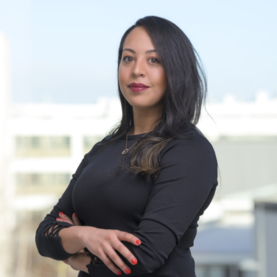
Full-time MBA participant Mounya Mouzdahir describes her experience so far at Warwick Business School, in particular her enjoyment of the Strategic Thinking module.
This year is very special for me, as I have dedicated it to knowledge and working on myself. The fact that I have left my safe zone, my “perfect job” and my family and friends to start a community and a career from scratch thousands of kilometres away from home sounded like a massive gamble. However, what pursuing an MBA at Warwick Business School means for me is that I am striving to learn about the world, others, and myself.
WBS modules and career coaching has constantly helped me keep that goal. Being part of this new diverse community and exposed to key learnings every day, there is a high risk of losing identity and urging to try everything without a key takeaway. However, the Strategic Thinking module has helped me to keep centred and aware of how I can contribute strategically to the challenges of tomorrow. This module was for me an opportunity to fetch that personal compass and meditate on my background, business challenges, and what I could do to map effective strategies to understand limitations and propose effective recommendations.
Understanding the business core:
I remember the opening of the first Strategic Thinking lecture with Professor John Colley asking us all these questions: Why do companies want constant revenue development and not just to be profitable? Why do companies buy each other? What does an acquisition mean beyond the financial transaction? Why do 60% of mergers and acquisitions fail? What considerations does management take regarding product development? How to take the pulse of the market and what frameworks are the most effective?
With an Industrial Engineering background and a track record of procurement strategy mapping in industrial supply chains, I was amazed by how much there is still to learn, and I suddenly felt this massive appetite to learn about all of these aspects and nurture my business knowledge.
Growing the “Business-man/woman” in you
Through the module's key theory about how businesses are shaped and the interesting and modern case studies that help you reflect on the secret behind businesses' success or failures, Strategic Thinking is not a fine science but it’s a major concept that touches all business organs: Operations, Sales & Marketing, supply chain, process development, innovation, and technology. Most importantly, this module made all MBAs aware that a strategy map is a brain that supports all of the organs working together to achieve collaborative targets and serve a purpose following the business vision.
The classic vision of launching a business for most masters scholars is mostly shaped around offer and demand, but strategic thinking spreads the lenses and introduces important key elements such as Macro and Micro-environments around the offering, the business purpose, creating a competitive advantage for a sustainable business and many more!
Being aware of these aspects through the case studies and learning through practice with interesting guest speakers made us all grow and think strategically.
An essential guide for businesses to break through the global recession
Launching businesses or sustaining them was always a challenge in a competitive market, but learning business strategy is essential especially right now, with supply chain disruptions, raw materials and talent scarcity. Our world now is much more challenging than it used to be and applying classic strategies like diversification or low cost is not enough. Consumer behaviours have shifted exponentially to a different offering and competitive advantages have become much more complex.
I have mostly enjoyed the modern behavioural strategy part of the module with Professor Hossam Zeitoun, this section of the module gave us all guidelines and a list of good readings to keep awake strategically in a changing globe, the tools provided are such a powerful toolkit for any strategy leader.
To conclude, Strategic Thinking has been my best learning experience so far in the MBA programme, I feel much more confident about my business maturity subsequently and I have much more will to deepen my knowledge through further reading and practice. I have evolved and enjoyed working on the module assignments as it has enabled me to do further research about case studies that have interested me personally. My MBA fellows were also an important asset in this learning experience by contributing accordingly with their diverse backgrounds, I will miss our constructive debates and case discussions during the lectures.




 X
X Facebook
Facebook LinkedIn
LinkedIn YouTube
YouTube Instagram
Instagram Tiktok
Tiktok